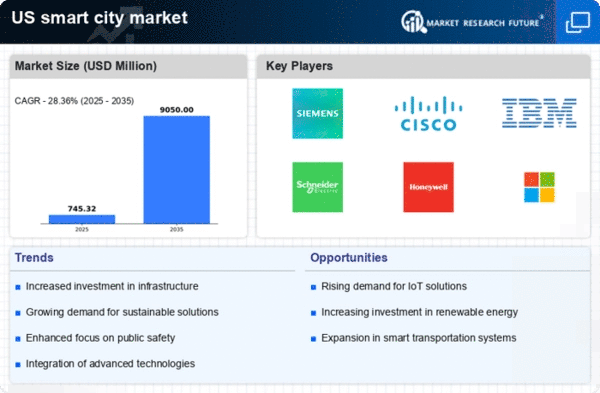Rising Urbanization Trends
The ongoing trend of urbanization is a significant driver for the smart city market. As more people migrate to urban areas, cities face challenges such as congestion, pollution, and inadequate infrastructure. By 2025, it is projected that nearly 85% of the US population will reside in urban areas, intensifying the need for smart solutions. The smart city market is responding to these challenges by implementing technologies that enhance urban living, such as smart transportation systems and waste management solutions. This shift towards smarter urban environments indicates a growing demand for innovative technologies that can address the complexities of urban life.
Increased Focus on Sustainability
Sustainability has emerged as a key driver in the smart city market. As environmental concerns gain prominence, cities are prioritizing sustainable practices to reduce their carbon footprint. The smart city market is witnessing a surge in the adoption of green technologies, such as renewable energy sources and energy-efficient buildings. By 2025, it is anticipated that investments in sustainable urban solutions will account for over 30% of total smart city expenditures. This focus on sustainability not only addresses environmental issues but also enhances the quality of life for residents. Consequently, cities are increasingly integrating sustainability into their smart city strategies, which is likely to shape future urban development.
Technological Advancements in IoT
The integration of Internet of Things (IoT) technologies is a pivotal driver for the smart city market. As cities increasingly adopt IoT solutions, they enhance operational efficiency and improve service delivery. For instance, the deployment of smart sensors and devices allows for real-time data collection, which can lead to better traffic management and energy efficiency. The smart city market is projected to reach approximately $1 trillion by 2025, driven by these technological advancements. Furthermore, IoT facilitates the development of smart grids, which optimize energy consumption and reduce costs. This trend indicates a growing reliance on interconnected systems, which is likely to shape the future landscape of urban living.
Government Initiatives and Funding
Government initiatives play a crucial role in propelling the smart city market. Federal and state governments are increasingly recognizing the need for sustainable urban development and are allocating substantial funding to support smart city projects. In 2025, it is estimated that public sector investments in smart city technologies will exceed $100 billion. These initiatives often focus on enhancing public safety, improving transportation systems, and fostering economic growth. Additionally, partnerships between government entities and private companies are becoming more common, facilitating the development of innovative solutions. This collaborative approach is likely to accelerate the adoption of smart technologies across various urban sectors.
Growing Demand for Enhanced Public Services
The demand for improved public services is a driving force behind the smart city market. Citizens are increasingly expecting efficient and responsive services from their local governments. In response, cities are leveraging technology to enhance service delivery in areas such as public safety, healthcare, and transportation. The smart city market is projected to grow as municipalities invest in digital platforms that facilitate better communication and service access for residents. By 2025, it is estimated that smart public service initiatives will account for a significant portion of the overall market growth. This trend suggests that cities are prioritizing citizen-centric approaches, which could redefine the relationship between governments and their constituents.















